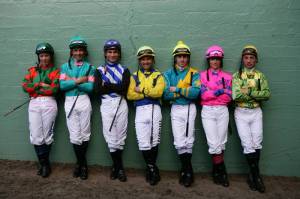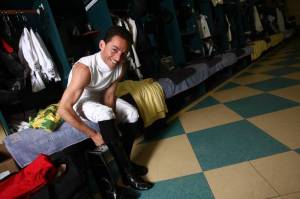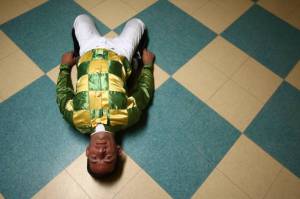Archive for September, 2009
book review: Internal Affairs
Posted by Amy Steele in Books on September 8, 2009

Author: Connie Dial
Publisher: The Permanent Press
In her debut novel, former commanding officer of the Los Angeles Police Department [LAPD] Connie Dial uses her experience and knowledge to pen a mystery about the LAPD. By choosing the dichotomous title Dial is able to weave a novel revolving around an Internal Affairs investigation of the LAPD and etch an accurate, multifaceted portrait about the internal affairs of the LAPD. Internal Affairs is both a whodunit and a guide to what drives many of LAPD’s finest.
When the mutilated body of a West Los Angeles police officer is found in the trunk of a police vehicle on the street in front of the LAPD Deputy Chief Jim McGann’s home all signs point to him as the doer. He had an affair with Alexandra Williams. But it cannot be that easy, can it? Welcome to the LAPD where there are good cops, bad cops, and cops who just look the other way until their pensions kick in. Fortunately Sergeant Mike Turner, investigator for Internal Affairs is leading up the case and he is the type of guy who likes boots on the ground investigative work. He doesn’t like to stay behind a desk and climb through the ranks like his girlfriend, Lieutenant Paula Toscano, adjutant for the Chief of Staff. For Paula, rank and propriety is everything. For Mike, justice and solid police work is most important. These concepts clash as the case moves ahead and more members of the LAPD get entangled in the death of Officer Williams.
She loved him but didn’t like this reversion. They should be discussing department policy and long-term objectives, not autopsies and search warrants. She like the adrenaline high too and missed it, but at this stage in their careers, they should be managing cases, not sitting up all night doing the grunt work. She was beyond the nuts and bolts of police work and thought he was, too. He’d told her he was. She knew this business was like a narcotic. Turner had gotten a taste and was hooked again. She’d wanted to call the shots, not do the bookings. He was slipping back into that other world. It was a small crack that in a few more days might become a canyon unless he walked away right then. Her real fear was that he didn’t want the life she wanted for him and would never really accept it. He had so much to offer and was capable of so much more. She felt as if he was settling for the easy, familiar road of his past and throwing away his future. She’d rehearsed saying all these things, making such a good argument, and then he hadn’t come home, at least not while she was conscious.
Internal Affairs is a rewarding, solid intrigue as the case gets increasingly complex and the players are reluctant to get involved in uncovering the truth as their own careers may be jeopardized. Internal Affairs provides a riveting glimpse, both expansive and specific, into what police officers might be going through on a daily, weekly and yearly basis in their careers. With Dial’s backstage viewpoint, Internal Affairs provides a snapshot into the lifestyle. Most importantly, the novel delves into the feminist aspect of the police force and the LAPD with “The Mafia,” a group of highly ranked women who meet weekly. Few women make it that far up in the ranks on any police force and Dial touches on this often [the unique challenges and prejudices these women face] in Internal Affairs [I think Dial has a compelling non-fiction book in her about this topic alone]. Internal Affairs is an absorbing read for scores of reasons.
book review: Lopsided
Posted by Amy Steele in Books on September 2, 2009
 Author: Meredith Norton
Author: Meredith Norton
Publisher: Penguin
Living in Paris sounded romantic. My parents loved answering their friends’ inquiries about me with, “Oh, Meredith is still in Paris.” The fact that I was doing nothing, had no career or plans for a career was irrelevant. Were I in Oakland they’d have had to look away and change the subject, but doing nothing in Paris was bragworthy.
In reality, living in Paris wasn’t romantic; it was highly stressful. Parisians are a stressed population in general, but being an American in France, a country still bristling from its demoted status as world leader, was especially taxing. Rarely a cocktail hour passed without my screaming that I didn’t vote for George Bush, didn’t like George Bush, and didn’t want to talk about George Bush.
What do you do when you live in France, married to a French national and return home to visit your family in California and receive terrible medical news? What do you do when your doctors tell you that your chance of surviving cancer is 40%? What do you do when your son is only 18-months-old and has little concept of what mommy is going through? For Meredith Norton, you face it with intelligence, humor and a strong family support system. Lopsided is a fresh, witty and at times brash memoir about breast cancer. It reminds me a bit of Amy Silverstein’s Sick Girl in that Norton holds little back and is honest and open about everything from the doctors to the pain to the side effects of chemotherapy and radiation to her feelings about friends and family coming out of the woodwork to visit her after hearing about her diagnosis. [The three worst groups of people to tell were the ones that had heard and didn’t know what to say when they saw me, the cancer survivors who expected me to feel some sort of camaraderie, and the pitiers who refused to believe that I wasn’t secretly a hysterical, hopeless, vomiting shell of my former self.]
Norton, the child of a surgeon, grew up in an exclusive neighborhood and attended private school. [My privileged upbringing had instilled in me a sense of entitlement that didn’t need reinforcing. That is really the American dream—not working hard and buying things, but reaching a place where there is no pressure to acknowledge that you already have everything.] She was often one of only a few black girls at her school and has many white friends. There’s one girl, Amy, who accused Norton of stealing money from her on a ski trip even though Amy attended school on scholarship and Norton came from a more wealthy family. The entire thing reeked of racism for Norton and she walked away from Amy forever. A few of the friends she had who have since gone their separate ways contacted her when they heard she had cancer and tried to make amends for their youthful disagreements. She did reconcile with some of these friends and discusses that in Lopsided.
Woven through her experiences as a cancer patient, Norton reminisces about her life experiences. Before she became an expatriate and moved to France and married Thibault, Norton had many occupations. She worked for three years as an inner-city Eighth grade English and U.S. history teacher. She produced a game show in England. For three years, she and her best friend Rebecca ran a design company called Norton Whittaker Inc. that went bankrupt and nearly destroyed their friendship.
Norton chronicles her unilateral mastectomy [What was left of my chest, my lone boob, served no purpose whatsoever but presented plenty of problems. If I wanted to appear presentable, I was forced to wear a falsie.], losing her hair [no stubble, just smooth, rubbery skin stretched tight and waxy. I spent hours caressing it.], chemotherapy [About midway through the chemo my nails started to change color. My fingernails were so sensitive that I found myself lifting things with the heel of my palm and turning pages with my elbows. Slowly, the purple crept higher and higher up my nail bed and the white slowly pulled back to meet it.], hot flashes [they caused her to sweat right through her pillow even when sleeping in her underwear], fear of her mortality [But what the therapist said was true: if I died prematurely Lucas wouldn’t even have any context in which to place me.], and her distain for cancer survivor Lance “Live Well” Armstrong.
There’s a plethora of memoirs in the bookstores these days but I assure you that you will not regret reading Norton’s Lopsided. Whether you have a connection to cancer or not, Lopsided is a scintillating read. Norton is your friend, your former college classmate, that sassy woman you want to join your book club or invite for a cup of coffee. Her sharp, sardonic sense of humor propels this book from page one.
When Rebecca found me in a corner at the Puma Outlet trying on a black wool cap and came at me with open arms it was the first time since skinny-dipping in snow runoff that I welcomed a hug. Since the diagnosis, all the hugs may have been intended to help me, but were really serving the hugger. Suddenly, these embraces were a refuge that I could hide my knobby, gray head behind. I was so ashamed to be contaminated by this ugly disease and have it broadcast so publicly.
STEELE INTERVIEWS: jockey Aaron Gryder
Posted by Amy Steele in Interview, TV on September 1, 2009
Jockeys provides this adrenaline rush of being on the track, on the horses in a race, behind the scenes. It’s an amazing show that focuses on eight jockeys: Chantal Sutherland, Kayla Stra, Mike Smith, Alex Solis, Aaron Gryder, Joe Talamo, Garrett Gomez and Corey Nakatami.
Garrett is a top ranked jockey and has an enviable career to other jockeys. Corey is the “bad boy” of racing. He is all mouth and muscle, fueled by volatile behavior. His grandparents were at an internment camp in 1942 on the site of what is now the Santa Anita race track. Despite his reputation, Corey is an excellent jockey and needs to be on the trainers’ short list of “in demand” riders. Chantal Sutherland is struggling with being a woman among all men. She has bonded with trainer Kristin Mulhall. They work out together every day. Through this friendship, Chantal gets to know many different horses and together the women are allies in the male-dominated sport. She dates veteran/ Hall of Fame jockey Mike Smith, who may have a chance to ride (once again) in the Kentucky Derby this season and their relationship may be further strained by their careers. Alex Solis is also a Kentucky Derby hopeful and nominated for the Hall of Fame.
In the first episode, Kristin owns a horse that she decides to run in a claiming race and wants Chantal to race it. At first, it looks like another trainer has claimed the horse, but Kristin has managed to fool everyone into not placing a claim on her horse. The other female on the track is Aussie Kayla Stra, a tough woman determined to make her mark despite the odds (very few women have had top success as jockeys). She faces sexism in the locker room and fights for every horse she gets to ride.
In episode two, 19-year-old arrogant young jockey Joe Talamo is riding I Want Revenge in an important qualifying race. Joe’s issue is that he is so young and he needs to show everyone that being young is not a detriment in racing horses. He has to prove that youth and talent have no connection. Competing against 19-year-old Talamo, is 39-year-old Aaron Gryder. When he was only 13-years-old, Aaron Gryder left home to pursue his dream of being a jockey and he hasn’t stopped racing. He was afraid of horses but soon lost that inhibition when he learned to ride them. Aaron doesn’t have the level of fame yet that he desires because he hasn’t had that huge international win. He’s not known as a money rider. He hasn’t won the Kentucky Derby or Preakness or World Cup in Dubai. Aaron and Well Armed have built a connection and the horse’s owners have asked him to race the horse in the billion dollar World Cup in Dubai. A win gives Aaron international exposure. Many opportunities will open up for Aaron. He will gain international attention and acclaim and increase his value as a jockey.
I recently spoke to Aaron Gryder.
Amy Steele [AS]: When did you realize you could make a career out of being a jockey?
Aaron Gryder [AG]: Once I moved out when I was 13 and spent that whole summer at that farm in Southern California. I spent that time getting on a few horses every morning and taking care of them until the time they went to bed and I went to bed. I knew then that it justified everything I had thought. I was so excited every morning to wake up early and be with the horses. At that point, it became not just a dream but it was becoming something that was part of my life now. And I just knew I needed to focus on my business and pay attention to everything. From that point on I was going to get the opportunity. I feel I’m pretty blessed to say at three or four what I wanted to do and never waver on that.
AS: What do you like about racing?
AG: I love the animals themselves. I’ve been fortunate to win thousands of races and to ride in England and Hong Kong and Saudi Arabia and Dubai and all over the country here. I look at my life and every friend I’ve got. All of my associations, every travel experience that I’ve had, 99% of them are because of the animal I fell in love with when I was young. I love the excitement of racing. I love the competitiveness.
I love how tough it is to win a race. I love the communication with horses. I love trying to become one with an animal that we might not always understand.
AS: How do you stay in shape as a jockey?
AG: We race five days a week and some days I’ll race one race and some days I’ll race eight or nine, just depending on what my agent has and what comes together on certain days. I’m pretty active seven days a week. If I’m not getting on horses in the morning which I usually do. On a race day, I will ride in the morning and then have time to do whatever I want but usually I need to lose a few pounds (at 5’6”, Aaron is one of the tallest jockeys racing today) and I’ve got different things that I’ll do: sometimes it’s Pilates, sometimes it’s Bikram yoga, sometimes it’s running up the mountain behind Santa Anita in a heavy sweat suit. I have personal trainers at the gym. I try to mix it up all the time to keep it interesting. Some people ask me if that is the hardest part of the job but I don’t look at it that way. If you told me as a kid that I’d have to lose three or four pounds a day and go through all these work-outs, I’d have signed up back then. I would have never taken any detours to avoid it.
AS: I wasn’t even thinking about the weight loss part of it. You need to be in shape obviously. Muscle also weighs more than fat. It sounds like you’re doing a lot of the things that are the lean, long muscle work-outs.
AG: Yeah, I never try to bulk up. Just riding horses in general gets to fit, makes you strong but I want to take it a step further and be better than the guy next to me.
AS: So on the show they were saying that you weren’t a “money rider” but you’ve had a lot of earnings.
AG: Yeah, I don’t think I’ve ever been a money rider. I’ve been leading rider in California, Kentucky, Chicago, New York. And to be a leading rider you’re winning a lot of big races too because that attracts more business. I’ve always done well in bigger stakes races but the elite races like The Kentucky Derby and the Triple Crown races, the Breeder’s Cups—those I have not yet captured and you can win as many stakes as you want but when you win those, the elite races, the World Cups and different races like that, I think people look at you different, they see you winning a race that they all have dreams to win. When you shoot high in this business, those are the ones that stamp you as a money rider and are what people consider a money rider. Fortunately with Well Armed, he became one of the best horses in the world and I’ve been able to accomplish something that very few riders have done and win the World Cup.
AS: What did riding in (and winning) the World Cup in Dubai mean to you?
AG: It was very exciting. It meant a lot this year because I knew we had a good chance. I had run Well Armed there last year and he had run third. I just thought this year that he was a better horse than he was last year. I thought we were going in there with not just a chance to hit the board but I expected to win when I went there and my brother went along with me and all week long I just said, ‘I feel so good about this and feel as if this is my race to win this year.’ It’s just nice when everything comes together. Horses are fragile and it’s a tough process to get the horse from the time they are weanlings to even get to the racetrack. And to go beyond there and get them to the races and to win the race. There are so many factors that can go against you. Well Armed was making everything happen so smoothly. He’s a very sound horse. He travels good. He shows up and runs a big race. It’s the most watched race in the world. In America, more people will watch the Triple Crown races. But that’s got such international flavor, that they’re watching it in Hong Kong and Japan and all through Europe and all over the world. It meant a lot to me as far as international recognition which could obviously open doors to more races abroad. It’s amazing what one race can do for you and how many eyes and how much attention you can get.
AS: When you were riding the race in Dubai, how was it different from the U.S.?
AG: It’s a much longer track. The stretch run is a lot longer. When you turn for home in America you either have 3/16th of a mile or a ¼ of a mile to run. When you turn into the stretch at Dubai, it’s 3/8th of a mile. So it’s literally double the length’s of Del Mar’s stretch. In American usually when you are turning for home, everyone is in full gear and really riding their horses aggressively but in Dubai you really can’t do that. I think they were behind me because they were trying to catch up with Well Armed at that point. I just wanted to sit there and give him a chance to stay comfortable and just ask him for his best last quarter of a mile home. I think we were two lengths in front at the quarter pole and once I did ask him, he just started extending himself.
AS: You look like you really have soft hands. I don’t know if that’s just with riding him (Well Armed) or if that’s how you ride always.
AG: Well some horses you ride a little bit differently. Some you ride a little more aggressive. Others like Well Armed, they say I helped Well Armed become a better horse but in the same breath I think he’s helped me become a better rider. Once I understood what he wanted and he just wanted to be left alone and let his big stride take advantage of the long courses and let him really reach out. And the only way he really was going to do that was if I was really soft with him and took a long hold. Early on, he was more aggressive and I probably took a shorter hold of him which takes away from their stride or sometimes I’d ask him to be in a position that maybe he didn’t want to. Anytime you ask a big, long-striding horse like that to do anything different, it might seem like you’re doing the right thing for him. But once I realized all I needed to do was let him do it because he was enjoying the game, he would find his best stride. Then once he would get in that full length and in a nice rhythm, I could do whatever I wanted with him. But it was just about leaving him alone early on.
In the World Cup, he broke so well I got to sit there quiet on him until he got to the quarter pole. It’s nice when you’re on a horse that every pole you think you’re in a winning position and you like the way they are traveling.









